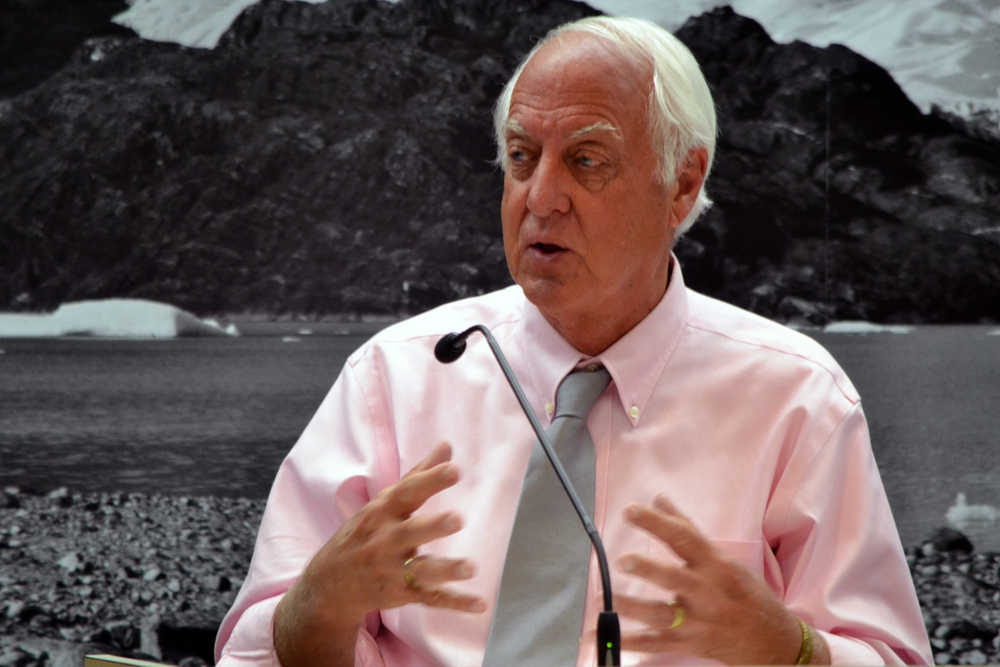The Juneau Assembly began working on an ordinance that might encourage housing development during a work session Monday, but the extent to which it will reduce the city’s high cost of housing — if it does at all — has yet to be determined.
The proposed ordinance would loosen city regulations regarding access standards for subdivisions. Currently, city code requires developers to run a 60-foot-wide road in the public right of way to access homes on subdivided land.
Steep, rugged terrain can make building such roads impossible in certain parts of town. In these cases, the city offers developers a hardship exemption, allowing them to build smaller, privately owned and maintained access roads. This is not ideal, according to Community Development Department Director Rob Steedle, but it is necessary in some cases.
“In my ideal Juneau, every lot has direct and practical access off the right of way,” Steedle said speaking to the Assembly Monday night. “That’s the Juneau I’d like to live in, but I don’t.”
The ordinance before the Assembly would change city code allowing developers to use smaller privately shared access roads at their discretion. In theory, this might drive down the cost of development because building roads to city standards isn’t cheap. If this turns out to be the case, city officials hope that it might spur new housing development.
The catch, as Mayor Ken Koelsch found out Monday, is that the city is unsure whether this will be the case. Koelsch asked city officials how many additional housing units the city could expect to see as a result of this ordinance. City Manager Rorie Watt acknowledged that mayor’s question was helpful, but he said it was “unanswerable” all the same.
City officials aren’t sure what type of housing development — single-family homes or multifamily apartment complexes — this ordinance might encourage if any at all. Unless it is passed, they might never know.
“I would hope that if you approve this ordinance, however you amend it, people will realize that property that is now unable to be developed will be developable,” Steedle said.
That’s not to say that the ordinance would be problem free. City officials and Assembly members alike recognized that it could have unintended consequences. One, according to City Attorney Amy Mead, is that it could create neighborhood disputes in which the city couldn’t intervene.
Normally, once developers build roads in public rights of way, the city takes them over and maintains them. This isn’t the case with private shared access roads, meaning that it is up to homeowners to maintain them. Keeping up with roads, especially in Southeast weather can be difficult, and it could create new difficulties for homeowners tasked with splitting the maintenance costs.
Another consequence, as Assembly member Beth Weldon pointed out, is that narrow, gravel shared private access ways aren’t always easy for emergency vehicles, such as fire trucks, to traverse.
Weldon, a former firefighter said that allowing more of these roads rather than wide, city-maintained roads “seems really backwards.”
She also said that developers might take advantage of the road-building shortcut offered by this ordinance more frequently if it is passed, a concern Watt said was “dead on.”
The Assembly pulled the ordinance from the coming week’s agenda, where it was scheduled for public hearing. The ordinance will come back before the Assembly during a work session “ideally in January,” according to Assembly member Jesse Kiehl.
Cruise wrap-up
Cruise industry representative Kirby Day spoke to the Assembly during its work session Monday about the past season and what the industry expects for next year.
According to Day, port manager for Princess Cruises, the industry expects a 4.6 percent increase in the number of cruise passengers visiting Juneau next summer. That translates to about 45,000 more passengers than the city saw during the past cruise season. The total number is expected to climb from about 1.005 million to an estimated 1.05 million.
“What you’ll see, if that bears out, is the most passengers we’ve ever had,” Day said. “For the region, and for Juneau, that’s really positive.”
For the first time since 2008, the city welcomed more than 1 million passengers during the past season. If Day’s prediction is correct, next year will break the record number of passengers that is now eight years old.
• Contact reporter Sam DeGrave at 523-2279 or sam.degrave@juneauempire.com.

